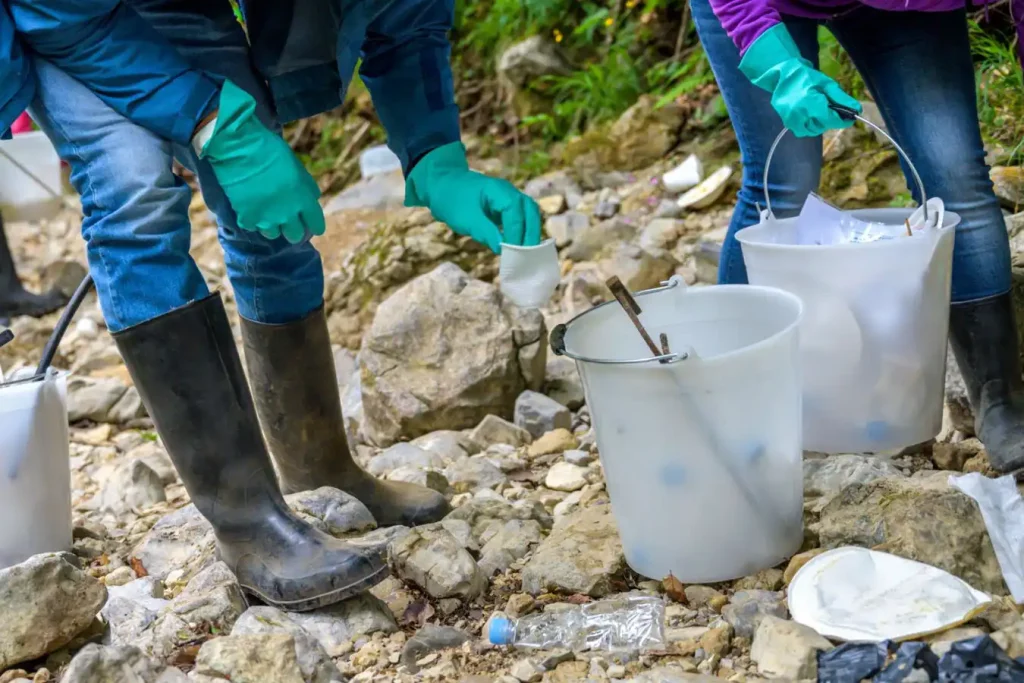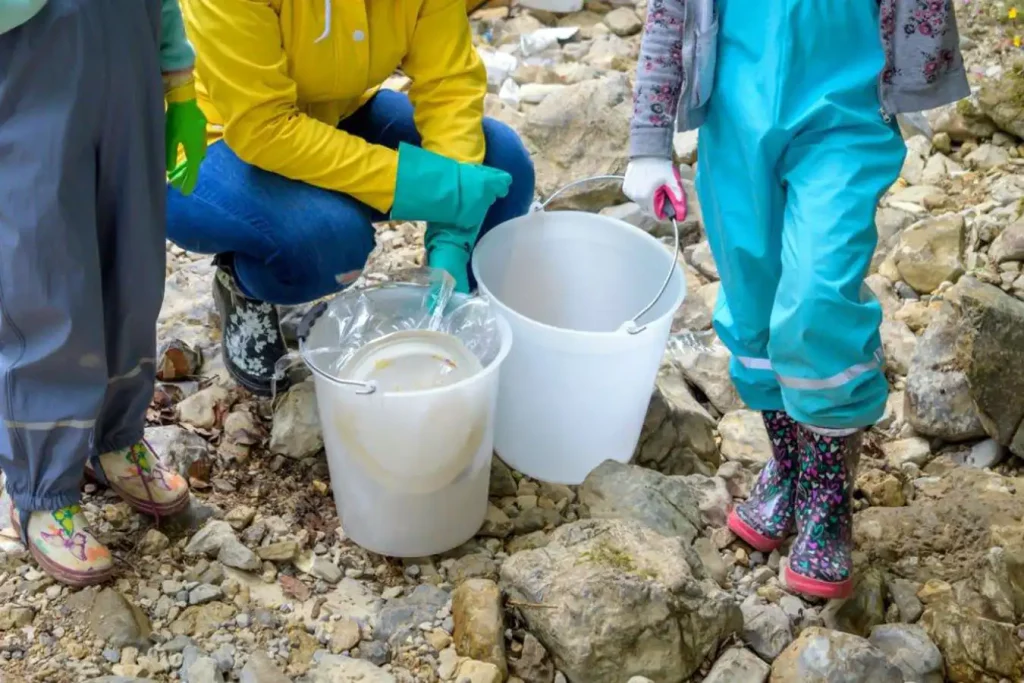Understanding “how to dispose of dishwater when camping” is a vital part of responsible and eco-friendly outdoor adventures.
This article aims to provide insightful and sustainable solutions to this very issue.
With a hint of excitement, get ready to learn practices that protect nature, just as it enriches our camping experiences!
We'll be exploring ideas that help keep our campsites clean, and more importantly, preserve the integrity of the natural environments we love.
So, prepare to embrace eco-consciousness as we delve into these practical guidelines.
As an avid outdoorsman who relishes the symphony of forest rain and the scent of camp foods, I'm thrilled to guide you on this environmentally friendly journey.
Understanding the Impact of Improper Disposal
Camping is a way of immersing ourselves in nature, yet many of us unwittingly harm that very same nature. How? Through the improper disposal of dishwater. Before delving into the best practices for dishwater disposal, let's understand the reasons why we should do it correctly.
Effects on Wildlife
Imagine this – you're back at home after a wonderful camping trip, but the leftover food particles and soap residue from your dishwater attract wildlife to the abandoned campsite. Animals, not adapted to human food or artificial substances, end up consuming what you've left behind. This can cause health issues in wildlife, potentially even leading to a dependency on human food. This seemingly innocuous act of simply throwing away dishwater could lead to significant harm to the wildlife we share our planet with.
Effects on Water Sources and Soil
Now, let's shift our focus to another scenario. Suppose you dump your soapy dishwater near a beautiful, crystal-clear stream that you found while hiking. The soap and food particles contaminate the water source, leading to potential harm to the aquatic life and even possibly polluting your future drinking water source. Even if you're nowhere near a water source, the nutrients in the wastewater can lead to an overgrowth of algae in the soil, disrupting the delicate ecological balance.
In both of these instances, we can see that a small, seemingly insignificant act has far-reaching consequences. However, armed with this knowledge, we can ensure our love for camping doesn't inadvertently harm our natural surroundings. Stay tuned for the next part of this series where we'll delve into effective and environmentally friendly methods for dishwater disposal while camping.
Learn more: Guide on How to Dispose of Camping Propane Tanks
Guidelines for Dishwater Disposal
The magic of camping lies in the escape it provides from the urban grind. But remember, it's a responsibility too. With proper dishwater disposal, we can ensure our getaway doesn't leave a permanent scar on nature. Here's how to do it.
General Outdoor Ethics and Guidelines
First and foremost, let's talk about some basic outdoor principles. The ‘Leave No Trace' ethic is at the core of these. It simply implies that when we enter nature, we should do our utmost to ensure that it remains as we found it. This philosophy extends to our dishwashing practices as well.

Respect for wildlife is another principle. We must avoid any activity that could potentially attract wildlife to human settlements or cause them harm. This includes ensuring that no food waste, including particles in our dishwater, is left behind.
Lastly, remember the camper's golden rule – whatever you bring in, you take out. This applies to everything, including your waste.
Specific Rules for Dishwater Disposal
Now, for dishwater disposal, here's what you need to remember. Always clean your dishes at least 200 feet away from water bodies to prevent contamination. Never leave food particles behind.
After washing your dishes, strain the leftover food particles using a mesh strainer or even a bandana. Pack these strained particles with your trash and take them out when you leave. The leftover gray water can then be scattered over a wide area, allowing it to be absorbed by the soil instead of concentrating in one spot.
Read more: How to Store Camping Propane Tanks
Equipment Needed for Proper Dishwater Disposal
With the guidelines in place, let's look at the tools you'll need to implement them. Don't worry, we're not going to weigh down your backpack with additional gear!
Essential Dish Cleaning Equipment
When it comes to cleaning dishes, minimalism is key. A small pot-scrubber or sponge, biodegradable soap, and a dish or two should suffice. Choose compact, lightweight items, preferably those that can be multi-purposed.
Additional Tools for Disposal
For disposal, you may need a lightweight mesh strainer to filter food particles from the dishwater. If you're a regular camper, investing in a camping sink or a collapsible bucket might be a good idea.
How to Dispose of Dishwater When Camping: Step-by-Step Guide
Now that we've covered the guidelines and gear, let's put them into practice. Let me walk you through a simple, yet effective, step-by-step process to dispose of your dishwater responsibly while camping.
Preparing Your Dishwashing Station
First up, find a good spot to set up your dishwashing station. Remember, it should be at least 200 feet away from any water source to prevent contamination. Your station should consist of your biodegradable soap, dish cleaning equipment, and your handy-dandy strainer or bandana for filtering food particles.
Remember, nature is not your pantry, so avoid washing your dishes near food storage areas to prevent attracting wildlife.
Cleaning Dishes with Minimum Water Use
Now, let's get those dishes clean! The trick here is to use as little water as possible. Start by wiping off leftover food from your dishes with a paper towel or reusable cloth. This helps minimize the amount of food waste ending up in your dishwater.
Next, with just a few drops of your biodegradable soap, scrub your dishes clean. Rinsing should be done with as little water as possible, remembering that the goal here is to minimize waste.
Disposing of Dishwater Properly
Now, for the most crucial part – disposal. Start by straining the dishwater to filter out any food particles. Remember, these particles should be packed out with your trash.
Once you're left with just the gray water, it's time for it to return to nature, but in a considerate way. Don't just dump it! Scatter it over a wide area, allowing the soil to absorb it slowly and naturally. This act of ‘broadcasting' your dishwater helps avoid creating a concentrated area of waste.
So there you have it – a step-by-step guide to responsible dishwater disposal while camping. It's a small effort with a big impact, ensuring that we can all continue to enjoy the great outdoors for generations to come.
Best Practices and Tips
Camping can be both a thrilling experience and a learning opportunity. It's a chance to immerse ourselves in nature and, importantly, learn how to respect it. Proper dishwater disposal is a crucial part of this respect. Let's dive into some best practices and tips to make this process even easier.
Minimizing Dishwater Production
Firstly, the less dishwater you create, the less you'll need to dispose of. It's that simple. Plan your meals in a way that uses the least amount of cookware. Consider one-pot meals, or better yet, go for foods that don't require any cooking at all like sandwiches or salads.
When it comes to washing, use as little water as possible. A small amount of water and a few drops of biodegradable soap go a long way. Remember, the goal is to minimize our impact on nature.
Tips for Disposing of Solid Food Waste
While you might be tempted to toss your food scraps into the bushes, remember that this can disrupt the natural environment and attract wildlife. Always pack out what you pack in. This includes food scraps.
Consider bringing a sealable bag or container to store food waste until you can dispose of it properly back home. A quick tip: If you're dealing with smelly food waste, double bag it and store it in your cooler to keep the odor at bay.
Learn more: Backpacking Vs Camping
FAQs about Dispose of Dishwater When Camping
What do you do with dishwater when camping?
Can I dump soapy water outside?
How do you dry dishes when camping?
What to do with grey water when camping?
Conclusion
As campers, we play a crucial role in protecting the environments we enjoy so much. Our practices, including how we dispose of dishwater, have lasting effects on these ecosystems.
Recapping our journey, we've explored the importance of proper dishwater disposal, understood its impact on the environment, and learned about the necessary equipment. We've also stepped through a guide on how to dispose of dishwater while camping, and I've shared some additional best practices.
The takeaway here is simple: respect nature. Minimize waste, pack out what you pack in, and always dispose of dishwater properly. Camping is about coexisting with nature, not dominating it. The more mindful we are, the longer we can enjoy the incredible beauty that camping offers. Happy and responsible camping!


